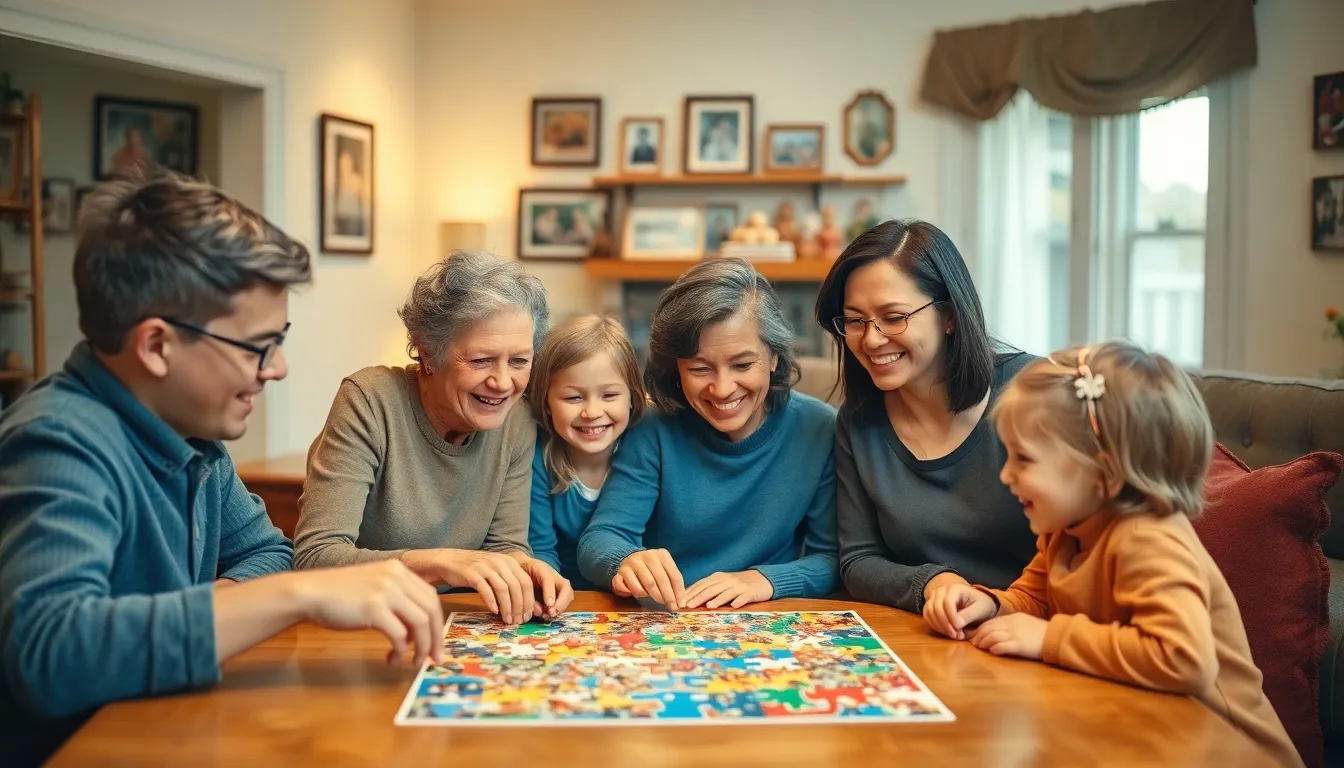Table of Contents
ToggleIn a world where screens dominate family time, family puzzle games offer a refreshing escape from digital distractions. These engaging challenges not only spark creativity but also ignite laughter, turning any ordinary evening into a memorable adventure. Imagine the thrill of working together to solve a mystery or the friendly banter that erupts when someone accidentally places a piece upside down.
Overview of Family Puzzle Games
Family puzzle games offer engaging ways to combine entertainment with cognitive challenges. These games enhance problem-solving skills while encouraging collaboration among family members. Traditional puzzles, like jigsaw sets, remain popular, allowing participants to piece together images while enjoying each other’s company.
Additionally, modern options include escape room games that promote group interaction through themed challenges. Board games featuring puzzles foster strategic thinking and creativity. Many families choose these games to balance screen time with meaningful interactions.
A variety of puzzle games cater to diverse interests. Some focus on logic, requiring players to think critically, while others emphasize pattern recognition. Everyone benefits from these stimulating activities, regardless of age.
Puzzle games also provide an opportunity for family bonding. Scheduled game nights can transform into cherished rituals, creating lasting memories. Playing together encourages communication and strengthens relationships.
Research shows that engaging in family games can lead to improved mental health. Gamers often experience reduced stress levels and increased happiness after playing. As families enjoy these activities, they reap social and emotional rewards while sharpening their minds.
With so many options available, families can easily find games that suit their preferences. Choices like crossword puzzles, Sudoku, or trivia games ensure everyone stays active and engaged. Family puzzle games cultivate a fun environment where laughter reigns supreme, creating more than just a game night; they forge connections.
Benefits of Playing Family Puzzle Games

Family puzzle games present numerous advantages for family dynamics. Engaging in these games can transform typical evenings into fun-filled bonding experiences.
Enhancing Problem-Solving Skills
Players face various challenges when tackling jigsaw puzzles or escape room games. Each puzzle requires strategic thinking and logical reasoning, sharpening cognitive abilities. Collaborative problem-solving emerges naturally as family members work together. Individuals learn to communicate their thoughts and share ideas effectively, promoting critical thinking skills. Statistics show that engaging in these activities can lead to improved brain function. Families often notice enhanced focus and creativity as members tackle intricate puzzles together.
Promoting Family Bonding
Quality time spent playing puzzle games strengthens family relationships. Game nights foster cooperation and teamwork, creating a sense of unity. Laughter and friendly competition help ease tension and create lasting memories. Children witness adults modeling patience and resilience, vital life skills during gameplay. Scheduled game nights give families something to look forward to, nurturing relationships and connections. Research indicates shared experiences lead to deeper emotional ties. Families thrive in environments filled with laughter and engagement, making puzzle games ideal for creating strong bonds.
Popular Types of Family Puzzle Games
Family puzzle games come in various forms, appealing to different interests and skill levels. These games promote bonding and engagement while challenging cognitive skills.
Jigsaw Puzzles
Jigsaw puzzles offer a classic option for family game nights. They require assembling pieces into a complete picture, which fosters teamwork and patience. Families often spend hours piecing together images that vary in complexity. Some jigsaw puzzles may feature 500 pieces or more, suitable for all ages. Select themes that reflect family interests, such as landscapes, animals, or favorite movies. Assembling a jigsaw puzzle encourages conversation and cooperation. Families often discover shared enjoyment as they track progress together.
Crossword Puzzles
Crossword puzzles challenge family members to think critically and recall knowledge across various subjects. These word games typically involve filling in a grid with clues provided for each word. Families can work together to find answers, making it a fun and educational experience. Crossword puzzles vary in difficulty, accommodating all ages and skill levels. Players might alternate solving clues or brainstorm answers, enhancing communication. Engaging with unfamiliar words helps broaden vocabulary while enjoying family time.
Logic Puzzles
Logic puzzles stimulate critical thinking and analytical skills in family members. These puzzles often present scenarios requiring deduction or problem-solving to arrive at a solution. Families can tackle riddles or brain teasers individually or collaboratively, promoting discussion on various strategies. Different types of logic puzzles exist, such as Sudoku or pattern recognition games. Families appreciate the challenge they bring, allowing them to sharpen reasoning skills. Finding solutions not only entertains but also fosters a sense of achievement and teamwork among family members.
Tips for Choosing the Right Family Puzzle Game
Consider the age range of family members. Selecting a puzzle game that suits everyone ensures all can participate and enjoy the experience together. Evaluate the interests of the family. Games that align with personal hobbies or themes tend to generate more excitement and engagement during play.
Check the complexity of the game. Moderate difficulty levels tend to encourage collaboration without leading to frustration. Prioritize games that promote teamwork. Many puzzles require players to work together, fostering communication and problem-solving skills.
Review the duration of gameplay. Shorter games accommodate younger children, while longer games appeal to older players seeking more in-depth experiences. Look for reputation and recommendations. Games endorsed by industry reviews and positive user feedback often provide quality experiences.
Assess the balance of challenge and fun. Engaging games strike a balance that stimulates critical thinking without diminishing the enjoyment. Choose age-appropriate content. Selecting puzzles that align with each family member’s vocabulary and cognitive skills enhances engagement and fulfillment.
Explore different formats. Jigsaw puzzles, crossword puzzles, or logic puzzles provide diverse experiences catering to various preferences. Test a few options before committing. Trying out different games can help determine which ones resonate most with the family dynamic.
Make the game selection part of a collaborative process. Involving family members in choosing a puzzle game fosters excitement and investment in the game night. Create an atmosphere of inclusivity. Everyone should feel comfortable sharing thoughts on potential games while also encouraging open dialogue about strategies during gameplay.
Family puzzle games serve as a vital tool for nurturing relationships and enhancing cognitive skills within the home. They create a space for laughter and collaboration while steering families away from screens. Engaging in these activities not only promotes teamwork but also helps develop essential life skills like patience and resilience.
Choosing the right game ensures everyone can participate and enjoy the experience. By prioritizing quality time through scheduled game nights, families can transform ordinary evenings into cherished memories. Embracing the joy of puzzle games fosters connections that last a lifetime, making them an invaluable addition to family life.




